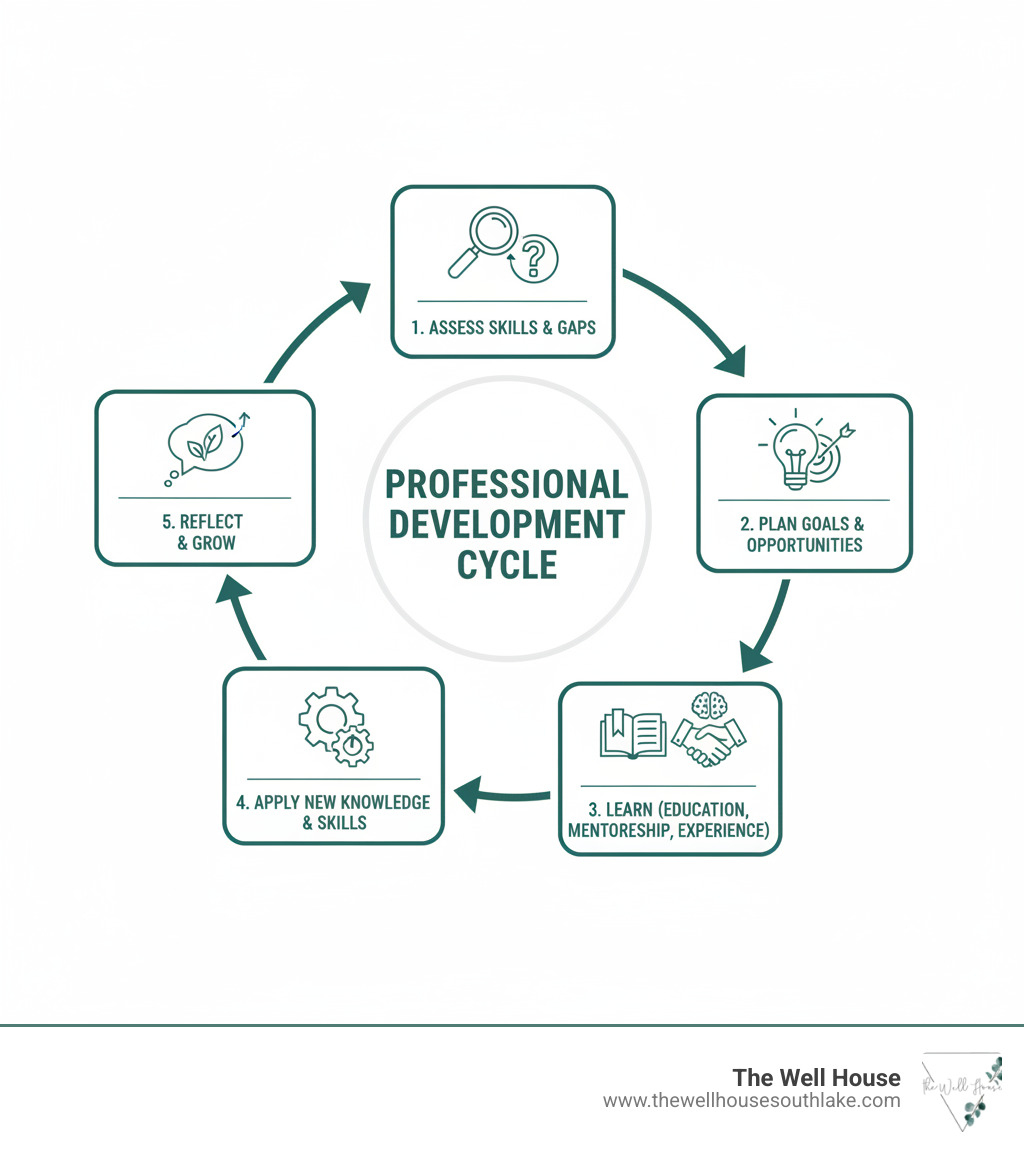Grow Your Counseling Career: Your Roadmap to Professional Development
Why Professional Development Counseling Matters for Your Career
Professional development counseling is the ongoing process of strengthening your knowledge, skills, and competencies as a mental health professional through education, training, supervision, and self-reflection. It’s not optional—it’s an ethical responsibility that keeps you current and effective as the field evolves.
Key Components of Professional Development for Counselors:
- Continuing education – Workshops, conferences, certificate programs, formal coursework
- Mentorship and supervision – Guidance from experienced practitioners and peer consultation
- Self-study – Journals, books, podcasts, research
- Networking – Professional groups, forums, community engagement
- Self-care practices – Burnout prevention and wellness for sustainable practice
The U.S. Bureau of Labor Statistics projects 22% job growth for mental health counselors from 2021 to 2031. With more opportunity comes higher expectations for competence and specialization. Ongoing growth helps you serve clients better, meet licensure requirements, and find greater fulfillment.

Terms related to professional development counseling:
Why is Ongoing Growth Essential?
- Evolving practices: Stay aligned with current, evidence-based care.
- Better outcomes: New skills and insights directly benefit clients.
- Career mobility: Open doors to specialization and leadership.
- Burnout prevention: Learning and peer support sustain passion.
- Personal growth: Deepen self-awareness to show up fully for clients.
The Core of Professional Development Counseling: Avenues for Lifelong Learning
There’s no single “right” path for professional development counseling. Blend formal CE, mentorship, self-study, and community so learning fits your goals and schedule.
Formal Continuing Education (CE)
- Meet licensure requirements with focused learning. The ACA Professional Development Center offers flexible, high-quality online options.
- Workshops, conferences, and certificates deepen skills and can position you for specialization.
Mentorship and Supervision
- Personalized guidance accelerates growth. The Well House offers supervision services.
- Peer consultation builds confidence and improves clinical decision-making.
Self-Study and Research
- Stay current using journals and sites like ScienceDaily.
- Read enduring texts like “On Being a Therapist” by Jeffrey Kottler (an essential read for therapists).
- Use podcasts for learning on the go.
Networking and Community
- Join professional associations for resources and advocacy.
- Connect online (for example, r/psychotherapy on Reddit) and through local meetups to reduce isolation and share wisdom.
Strategic Growth: Aligning Development with Your Career Path
Intentional professional development counseling aligns learning with your goals, not just CE checklists.
Identifying Your Goals and Gaps
Use honest self-assessment to target growth. Interests (like supporting young professionals or millennials) reveal where to deepen skills. Pick three skills to strengthen and one step for each.
The Benefits of Professional Development Counseling
Improved outcomes, confidence, and clarity follow targeted learning. Specialization lifts your professional identity and expands opportunities.
Choosing the Right Opportunities
- Cost vs. benefit: Balance price, time, and impact.
- Relevance: Choose trainings that directly serve your clients and goals.
- Modality: Online for flexibility; in-person for energy and networking.
- Accreditation: Ensure CE credit applies (e.g., CACREP-aligned programs).
Integrating Self-Care and Specialization
Sustainable growth blends self-care with focused expertise.
The Role of Self-Care in Professional Development
Wellness is an ethical imperative. When we’re depleted, clinical judgment suffers. Prioritize rest, boundaries, and supports such as therapy, supervision, and mindfulness. Explore mental health for professionals.
Leveraging Development for Specialization
Deepen modalities (CBT, EMDR, somatic work) and/or focus on energized populations. Specialization improves outcomes and visibility—e.g., career coaching for managers in communities like Southlake, Westlake, Grapevine, Roanoke, and Trophy Club.
Overcoming Barriers to Professional Growth
Even with full caseloads, professional development counseling is doable with small, consistent steps.
- Time: Micro-learn—podcasts on commutes, 30-minute journal reads, short webinars, self-paced CEs.
- Cost: Use member CEs, free resources, and employer reimbursement; start peer consultation groups.
- Motivation: Choose topics you care about to counter burnout; learn with a colleague for accountability.
- Finding fit: Set clear goals, seek recommendations, and verify accreditation before investing.
Introduction

As counselors, we can’t pour from an empty cup—and we can’t guide clients through terrain we haven’t explored ourselves. Professional development counseling is the heartbeat of a sustainable career: assess where you are, plan goals, learn, apply in practice, then reflect and repeat.
Demand is rising. The Bureau of Labor Statistics projects 22% job growth for mental health counselors from 2021 to 2031. With opportunity comes responsibility: staying ethical, evidence-based, and well.
At The Well House in Southlake, TX (serving Westlake, Grapevine, Roanoke, and Trophy Club, with telehealth options), we champion collaborative, holistic growth across mind, body, and spirit. We help clinicians align learning with values, prevent burnout, and translate knowledge into real-world impact.
I’m Jennifer Kruse, LPC-S. My focus in supervision and professional development is helping counselors cultivate not just techniques, but embodied wisdom through reflection and consistent self-care.
Related areas we support at The Well House include emotional intelligence counseling, mental health for professionals, and counseling for graduate students.
Why Professional Development Counseling Matters for Your Career
Professional development counseling strengthens knowledge, skills, and ethical competence through education, training, supervision, and reflection. It keeps care current and client-centered while meeting licensure standards in a rapidly evolving field.
Key Components of Professional Development for Counselors:
- Continuing education – Workshops, conferences, certificate programs, and formal coursework
- Mentorship and supervision – Guidance from experienced practitioners and peer consultation
- Self-study – Reading journals, books, listening to podcasts, and staying current with research
- Networking – Joining professional organizations, attending forums, and building community
- Self-care practices – Preventing burnout and maintaining your own wellness to serve clients effectively
The counseling profession continues to grow—BLS projects 22% job growth (2021–2031)—and with it, expectations for competence and specialization.
Terms related to professional development counseling:
What is Professional Development Counseling?
A commitment to lifelong learning that maintains competence and integrates evidence-based practices into daily work—an ethical obligation to clients and the profession.
Why is Ongoing Growth Essential?
- Evolving research: Integrate current, evidence-based care.
- Outcomes: Clients benefit from refined skills and insight.
- Advancement: Specialize, lead, supervise, and innovate.
- Burnout protection: Learning and support sustain resilience.
- Personal growth: Deepen self-awareness and empathy.
The Core of Professional Development Counseling: Avenues for Lifelong Learning
Professional development is most effective when you mix structure with flexibility.
Formal Continuing Education (CE)
- Meet renewal requirements through targeted trainings; explore the ACA Professional Development Center.
Mentorship and Supervision
- Learn in relationship: case consults, ethical guidance, identity development. The Well House provides supervision services.
Self-Study and Research
- Keep practice evidence-based with journals and ScienceDaily.
- Read texts like Kottler’s “On Being a Therapist” (an essential read for therapists).
Networking and Community
- Reduce isolation and share ideas—try forums like r/psychotherapy on Reddit and local meetups.
Strategic Growth: Aligning Development with Your Career Path
Think strategically: connect what you learn to where you’re headed.
Identifying Your Goals and Gaps
Name the skills and populations that energize you (e.g., young professionals or millennials); commit to 1–3 focused goals.
The Benefits of Professional Development Counseling
Targeted growth improves outcomes, confidence, and your professional identity—often leading to meaningful specialization.
Choosing the Right Opportunities
Prioritize relevance, verify accreditation, and balance cost, time, and modality (online vs. in-person).
Integrating Self-Care and Specialization
Self-care and niche expertise reinforce each other.
The Role of Self-Care in Professional Development
Wellness is foundational and ethical. Model the boundaries and routines you recommend to clients. See: mental health for professionals.
Leveraging Development for Specialization
Expand modalities (CBT, DBT, EMDR) and focus on populations that fit your mission. If you serve professionals, consider career coaching for managers in Southlake, Westlake, Grapevine, Roanoke, and Trophy Club.
Overcoming Barriers to Professional Growth
- Time: Use micro-learning and self-paced CEs; block a monthly PD hour.
- Cost: Tap member perks, scholarships, low-cost peer consults, and employer reimbursement.
- Motivation: Pick topics you love; learn with a peer for accountability.
- Relevance: Define goals, ask colleagues for vetted options, confirm board approval.
Introduction
Why Professional Development Counseling Matters for Your Career
Professional development counseling is the ongoing process of strengthening your knowledge, skills, and competencies through education, training, supervision, and reflection. It’s an ethical responsibility that improves client care and supports your career.
Key Components of Professional Development for Counselors:
- Continuing education – Workshops, conferences, certificate programs, and formal coursework
- Mentorship and supervision – Guidance from experienced practitioners and peer consultation
- Self-study – Reading journals, books, listening to podcasts, and staying current with research
- Networking – Joining professional organizations, attending forums, and building community
- Self-care practices – Preventing burnout and maintaining your own wellness to serve clients effectively
Most boards require CE for renewal, and demand is rising (BLS projects 22% job growth from 2021 to 2031). Strategic growth helps you stay current, specialize, and serve clients well.
Terms related to professional development counseling:
What is Professional Development Counseling?
A lifelong-learning commitment that keeps practice evidence-based and ethically sound.
Why is Ongoing Growth Essential?
- Evidence-based care
- Improved outcomes
- Career advancement
- Burnout prevention
- Personal growth
The Core of Professional Development Counseling: Avenues for Lifelong Learning
Blend structured and informal learning for steady growth.
Formal Continuing Education (CE)
- Use the ACA Professional Development Center and targeted certificates.
Mentorship and Supervision
- Personalized guidance and identity development; explore our supervision services.
Self-Study and Research
- Scan journals and ScienceDaily; read Kottler’s classic (an essential read for therapists).
Networking and Community
- Build collegial support and reduce isolation—join forums like r/psychotherapy on Reddit and local groups.
Strategic Growth: Aligning Development with Your Career Path
Set a direction, then choose learning that moves you toward it.
Identifying Your Goals and Gaps
Clarify populations and skills that inspire you—such as young professionals or millennials.
Benefits
Focused development boosts outcomes, confidence, and specialization.
Choosing the Right Opportunities
Balance relevance, time, cost, modality, and accreditation.
Integrating Self-Care and Specialization
Two pillars of sustainable practice: wellness and focused expertise.
The Role of Self-Care in Professional Development
Protect fitness to practice with boundaries, rest, and reflective supports. Resource: mental health for professionals.
Leveraging Development for Specialization
Deepen modalities and define your niche—e.g., career coaching for managers for clients across Southlake, Westlake, Grapevine, Roanoke, and Trophy Club.
Overcoming Barriers to Professional Growth
Time, cost, motivation, and fit are common problems. Tackle them with micro-learning, member/free CEs, peer consults, aligned topics, and accreditation checks before enrolling.











